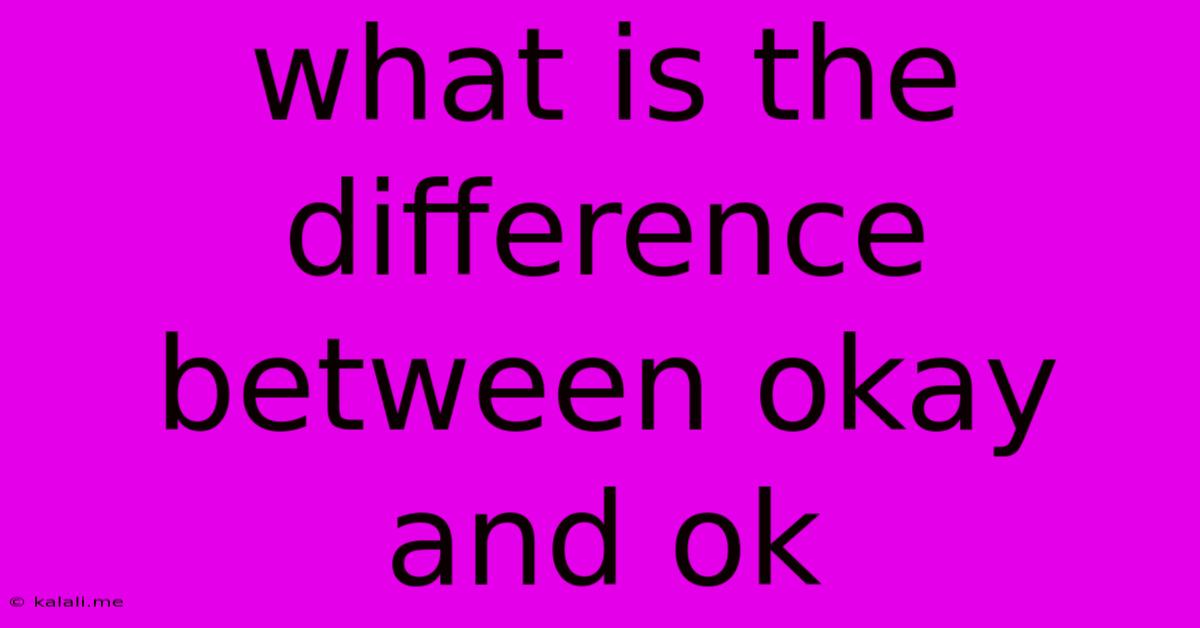What Is The Difference Between Okay And Ok
Kalali
Jun 08, 2025 · 3 min read

Table of Contents
What's the Difference Between "Okay" and "OK"? A Deep Dive into Spelling and Usage
So, you're wondering about the difference between "okay" and "OK"? It's a question that pops up more often than you might think! While both words essentially mean the same thing – expressing agreement, acceptance, or acknowledgment – there are subtle nuances in their usage and a significant difference in their spelling. This article will delve into the history, common usage, and the subtle stylistic differences between these two ubiquitous words.
A Brief History: From "O.K." to "Okay"
The origin of "OK" is shrouded in some mystery, with several competing theories swirling around its emergence in the mid-19th century. One popular theory links it to an abbreviation of "oll korrect," a playful misspelling of "all correct." Regardless of its precise origins, "OK" quickly gained popularity, spreading rapidly through newspapers, telegrams, and everyday conversation.
"Okay," on the other hand, is simply a later spelling evolution of "OK." As language adapts and evolves, it's not uncommon for abbreviations and informal spellings to become fully accepted words. This is precisely what happened with "okay."
Spelling and Style Considerations: When to Use Which
The key difference lies in the spelling and the resulting stylistic impact. "OK" maintains a more informal, abbreviated feel, suggesting a quicker, less deliberate communication. Think of a quick text message, a casual email, or a note scribbled on a whiteboard. It's efficient and conveys a sense of immediacy.
"Okay," on the other hand, is generally considered more formal. It’s the preferred choice in professional writing, academic papers, and any context where a more polished and refined tone is desired. It's the word you'd find in a business report, a formal letter, or a meticulously crafted blog post (like this one!).
Contextual Usage: Choosing the Right Word
The best way to understand the difference is by looking at context:
- Informal settings: "OK, let's do it!" "My flight is OK." In these casual exchanges, "OK" fits perfectly.
- Formal settings: "The results are okay, but further investigation is needed." "It is okay to disagree." Here, "okay" presents a more refined and polished look.
- Emphasis: Sometimes, "okay" can carry slightly more weight. Saying "That's okay" might sound more reassuring than "That's OK". This is a subtle difference, but it exists.
Beyond Simple Agreement: Nuances in Meaning
While both words primarily signify agreement or acceptance, they can also express other subtle shades of meaning. Consider the context:
- "Okay" as a softener: "Okay, I understand your point, but..." This usage softens the transition to a counter-argument.
- "OK" as a simple acknowledgment: A quick "OK" in a text message might simply signal that the message was received and understood, without necessarily implying full agreement.
Conclusion: A Matter of Style and Context
Ultimately, the choice between "okay" and "OK" comes down to style and context. While the core meaning remains consistent, the spelling subtly alters the perceived level of formality. Using "OK" conveys a more casual and immediate tone, while "okay" projects a more formal and refined image. Understanding these subtle differences will enhance your writing and help you choose the word that best fits the situation. So, whether you choose "okay" or "OK," remember to select the spelling that best reflects the tone and formality of your communication.
Latest Posts
Latest Posts
-
Why Is It Called Fifty Shades Of Grey
Jun 08, 2025
-
Names That Are The Same In Spanish And Japanese
Jun 08, 2025
-
Is Work A Scalar Or Vector
Jun 08, 2025
-
The Rain Gives You Permission To Slow Down
Jun 08, 2025
-
Can You Attend Traffic School After Ticket Is Paid
Jun 08, 2025
Related Post
Thank you for visiting our website which covers about What Is The Difference Between Okay And Ok . We hope the information provided has been useful to you. Feel free to contact us if you have any questions or need further assistance. See you next time and don't miss to bookmark.